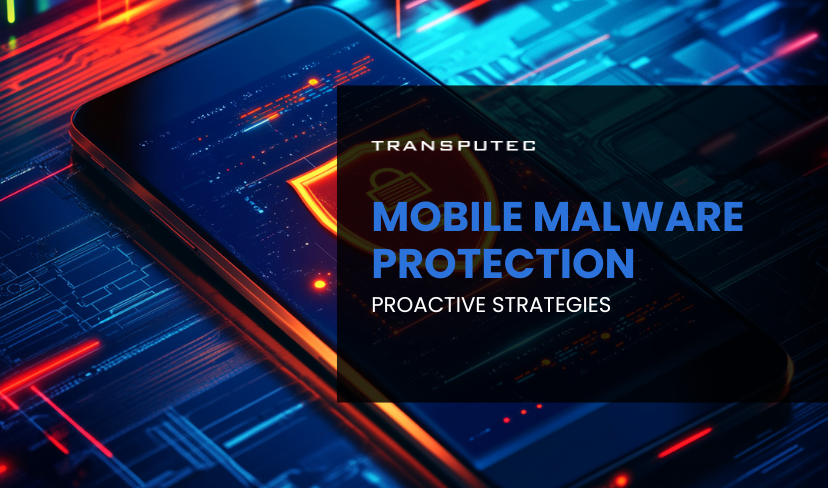Written by KRITIKA SINHA | MARKETING
In the modern business world, mobile devices have become essential. However, with this digital shift comes a rising threat: mobile malware. Designed to exploit weaknesses in smartphones and tablets, it can disrupt business operations, steal sensitive data, and harm your brand’s reputation. As attackers get more sophisticated, the risks are growing for businesses of all sizes. But there’s good news—you can secure your organisation with proactive and robust mobile malware defences.
The Role of Transputec in Mobile Malware Protection
When it comes to securing your business against mobile malware, having a partner with proven expertise is invaluable. At Transputec, we specialise in implementing advanced mobile security solutions that address your specific needs. From MDM to endpoint security and malware response solutions, we ensure comprehensive protection against mobile threats. Our team stays updated on the latest malware developments, enabling us to defend your organisation proactively.
Understanding Mobile Malware and Its Threat to Businesses
Mobile malware includes various malicious software types specifically targeting mobile devices. This malware can operate in the background, stealing personal and corporate data, tracking locations, or accessing sensitive company systems. In 2023 alone, the rate of these attacks surged by over 30%, making it one of the fastest-growing cybersecurity threats worldwide.
Key Types:
- Trojan Horse Programs – Often disguised as legitimate apps, Trojans can download additional malicious software once installed on a device.
- Ransomware – Locks mobile devices or encrypts data, demanding a ransom from the user for access.
- Spyware – Quietly collects data on device usage, location, and app activities without users’ knowledge.
- Adware – Floods devices with unwanted advertisements, often hiding malware.
Mobile malware threats are evolving, and even seemingly harmless apps can conceal malicious intent. These apps may find their way into corporate networks if employees download them on work devices. When left unchecked, mobile malware can compromise data integrity, drain resources, and weaken trust in a brand.
How Mobile Malware Infiltrates Your Business
The most common methods mobile malware uses to infiltrate business devices are user error, phishing attacks, and unsecured networks. Mobile devices are particularly vulnerable due to:
- Frequent use of public Wi-Fi – Many employees connect to public Wi-Fi, which can be exploited by cybercriminals to access device data.
- Phishing messages – Mobile devices often receive phishing links via SMS or social media apps, and users may unknowingly click on them.
- Weak passwords – Weak or reused passwords can give attackers easy access to mobile devices and linked accounts.
- Unsecured app downloads – Apps not downloaded from official app stores can carry malware, especially on devices with fewer security restrictions.
Businesses must ensure their employees understand these vulnerabilities to prevent mobile malware incidents and maintain a secure, reliable mobile environment.
Protect your Business 24/7 with Transputec!
Our Managed SOC Cost Calculator estimates potential expenses for security tools and other costs based on your requirements.
Strategies to Protect Your Business from Mobile Malware
Combatting mobile malware requires both proactive strategies and strong defences. Here are some expert-recommended practices to minimise the risk of mobile malware infiltrating your organisation.
1. Adopt a Comprehensive Mobile Security Policy
A comprehensive mobile security policy should outline guidelines for safe mobile device usage. This policy must:
- Specify restrictions on downloading apps from unknown sources.
- Include guidelines on the secure use of public Wi-Fi.
- Require that all devices have antivirus software.
Encourage employees to follow these guidelines diligently and reinforce the importance of strong, unique passwords for all accounts.
2. Enforce Mobile Device Management (MDM)
Mobile Device Management software gives companies a centralised way to monitor, manage, and secure mobile devices used within the organisation. With MDM, you can:
- Track mobile devices across the organisation.
- Ensure that only trusted apps are installed on company devices.
- Remotely wipe data from lost or compromised devices.
Transputec offers MDM solutions designed to simplify the protection of mobile assets, ensuring they remain secure and compliant with organisational policies.
3. Invest in Mobile Malware Detection and Response Solutions
Effective mobile malware detection tools can immediately notify administrators of suspicious activity, allowing for rapid responses. Consider deploying:
- Anti-malware apps that actively scan devices.
- Endpoint security that blocks potential threats before they reach the device.
- Firewalls tailored to mobile devices.
An expert partner, like Transputec, can assess your current security posture and recommend best-fit solutions that safeguard mobile endpoints against malware threats.
4. Train Employees on Mobile Security Awareness
Employee awareness is crucial in preventing mobile malware. Frequent training can educate employees on:
- Identifying phishing attacks and suspicious links.
- Recognising signs of mobile malware, such as unexpected pop-ups or slow performance.
- Practicing secure app downloads and data-sharing practices.
Equip employees with the knowledge to recognise potential malware threats and respond appropriately. A proactive approach to mobile security education will reduce vulnerabilities and improve overall resilience.
5. Enable Multi-Factor Authentication (MFA)
MFA is one of the simplest yet most effective ways to protect devices against unauthorized access. Implement MFA on any accounts accessible through mobile devices, as it adds an extra layer of security even if a password is compromised.
By enforcing MFA, your business can reduce the risk of unauthorized access to sensitive information. Remember, with MFA, even if malware captures a user’s credentials, a second verification step prevents full access.
Conclusion: Protect Your Business from Mobile Malware Threats
The rise of mobile malware is undeniable, and as mobile technology becomes even more embedded in the workplace, businesses must stay vigilant. Implementing the right security measures, educating employees, and partnering with experts like Transputec are essential steps to safeguarding your operations. Let us help you create a secure mobile environment that minimises risk and keeps your organisation resilient.
Contact us today to learn how Transputec can protect your business from mobile malware.

Secure Your Business!
Ready to explore how we can enhance your security posture? Contact us today to speak with one of our experts.
FAQs
What is mobile malware, and why is it a threat to businesses?
It is malicious software targeting mobile devices. It can disrupt operations, steal sensitive data, and harm a business’s reputation. Because mobile devices are increasingly used for business tasks, mobile malware poses a significant risk to corporate networks and data integrity.
How can I tell if a device is infected with mobile malware?
Signs of mobile malware include unexpected pop-up ads, battery drain, slow performance, and data usage spikes. A compromised device may also experience unauthorised access, as the malware can run in the background, consuming resources or accessing confidential information.
What is Mobile Device Management (MDM), and how does it help prevent mobile malware?
MDM is software that enables businesses to monitor, manage, and secure mobile devices used by employees. MDM solutions enforce security policies, track devices, and remotely wipe data if necessary. This prevents unauthorised app installations and provides quick responses to threats.
Can mobile malware bypass antivirus software?
Yes, sophisticated mobile malware can bypass antivirus software if the device has no additional protections, such as endpoint security and firewalls. Keeping antivirus software updated, using multi-layered security, and enforcing mobile security policies are essential for effective protection.
Why is employee training important for mobile malware prevention?
Employees often access sensitive data via mobile devices, making them prime targets. Training helps employees recognise phishing attempts, secure devices, and practice safe downloading. Informed employees reduce vulnerabilities and prevent many malware incidents.






